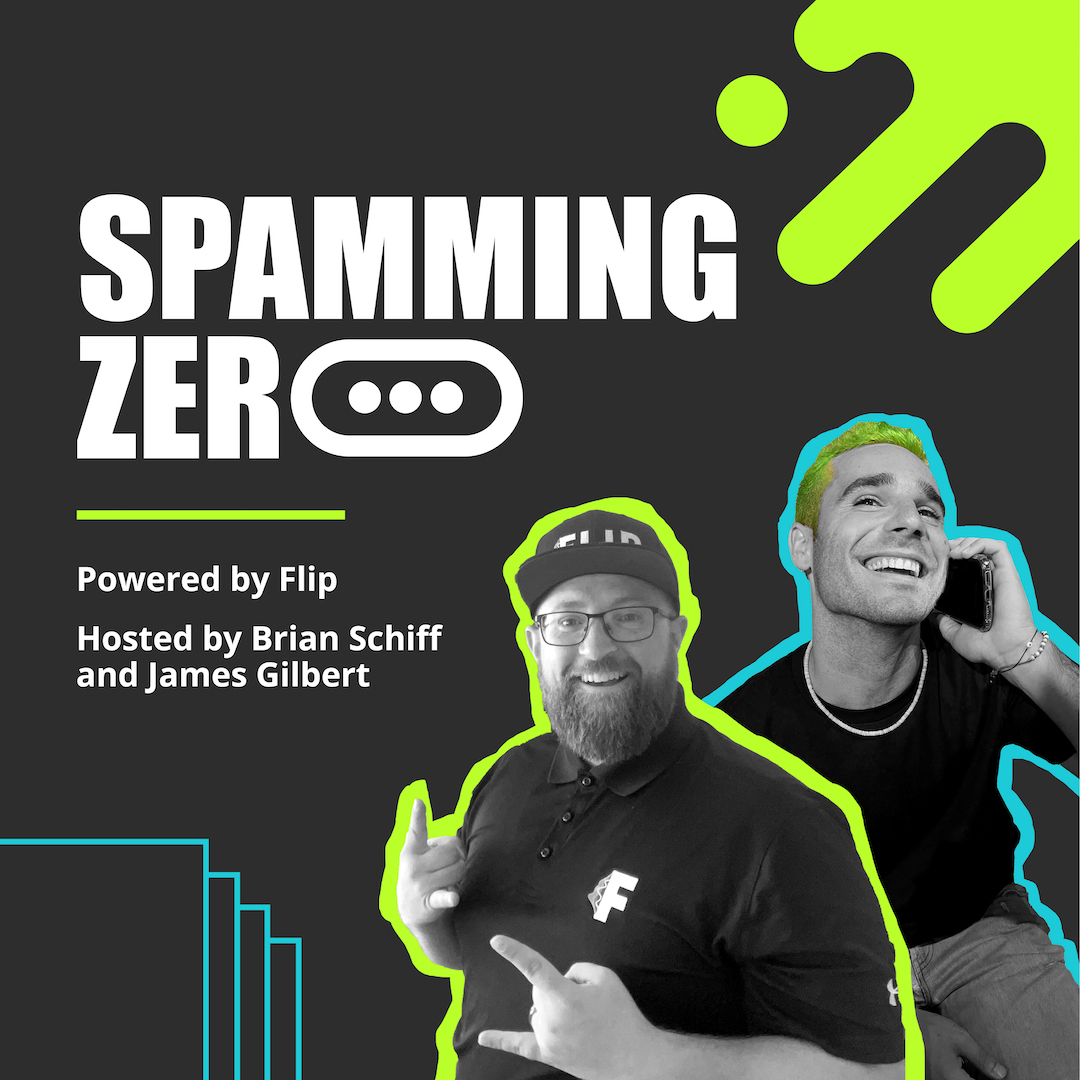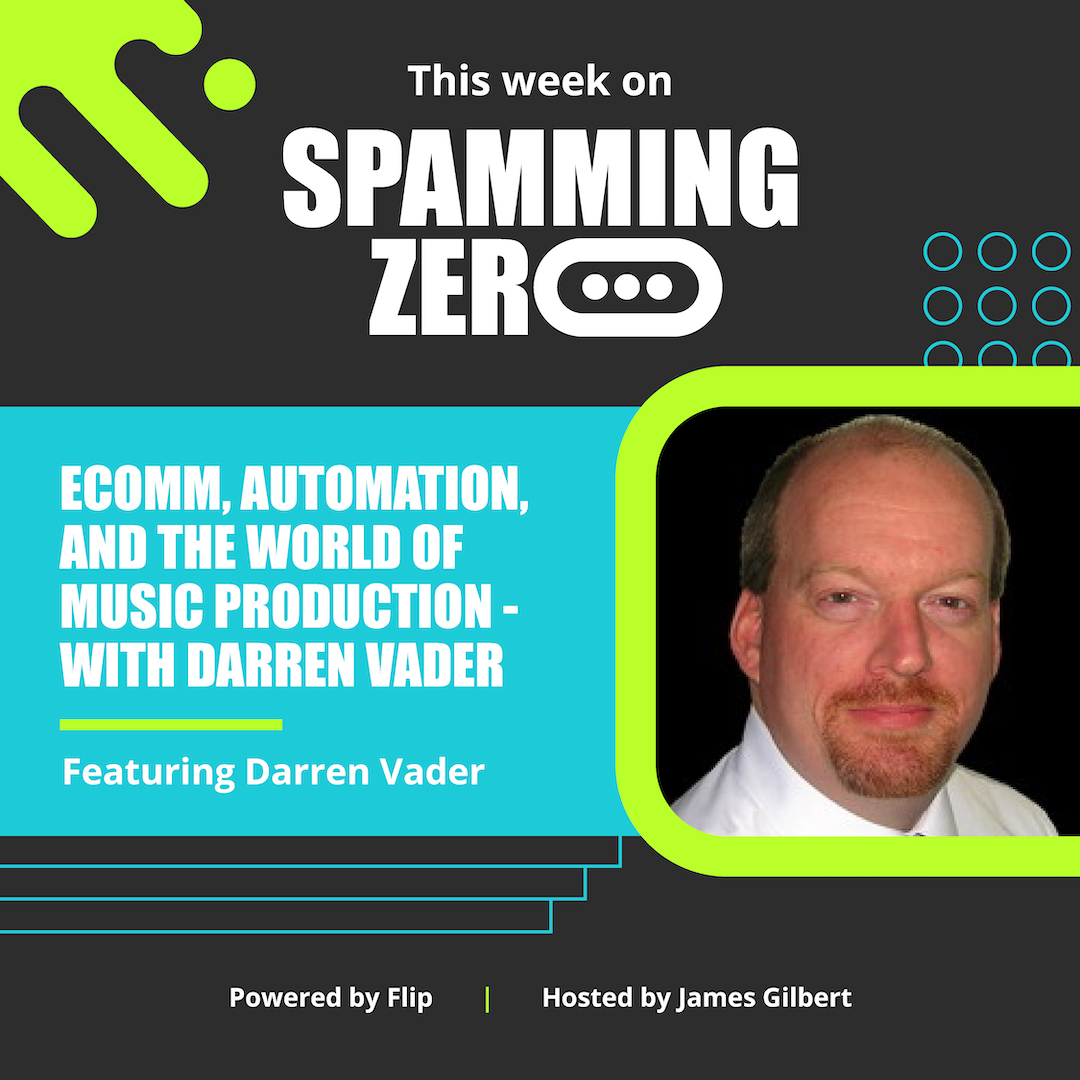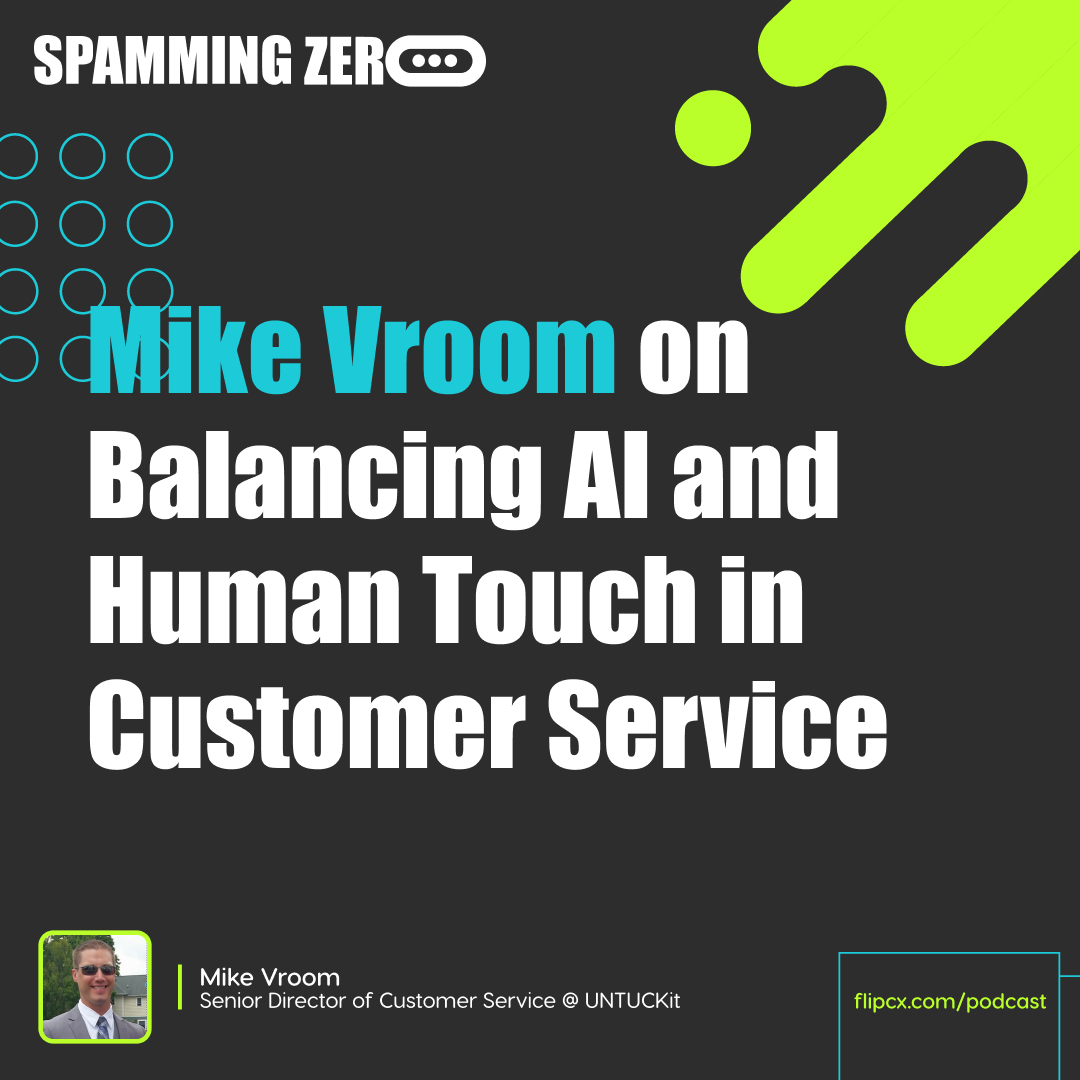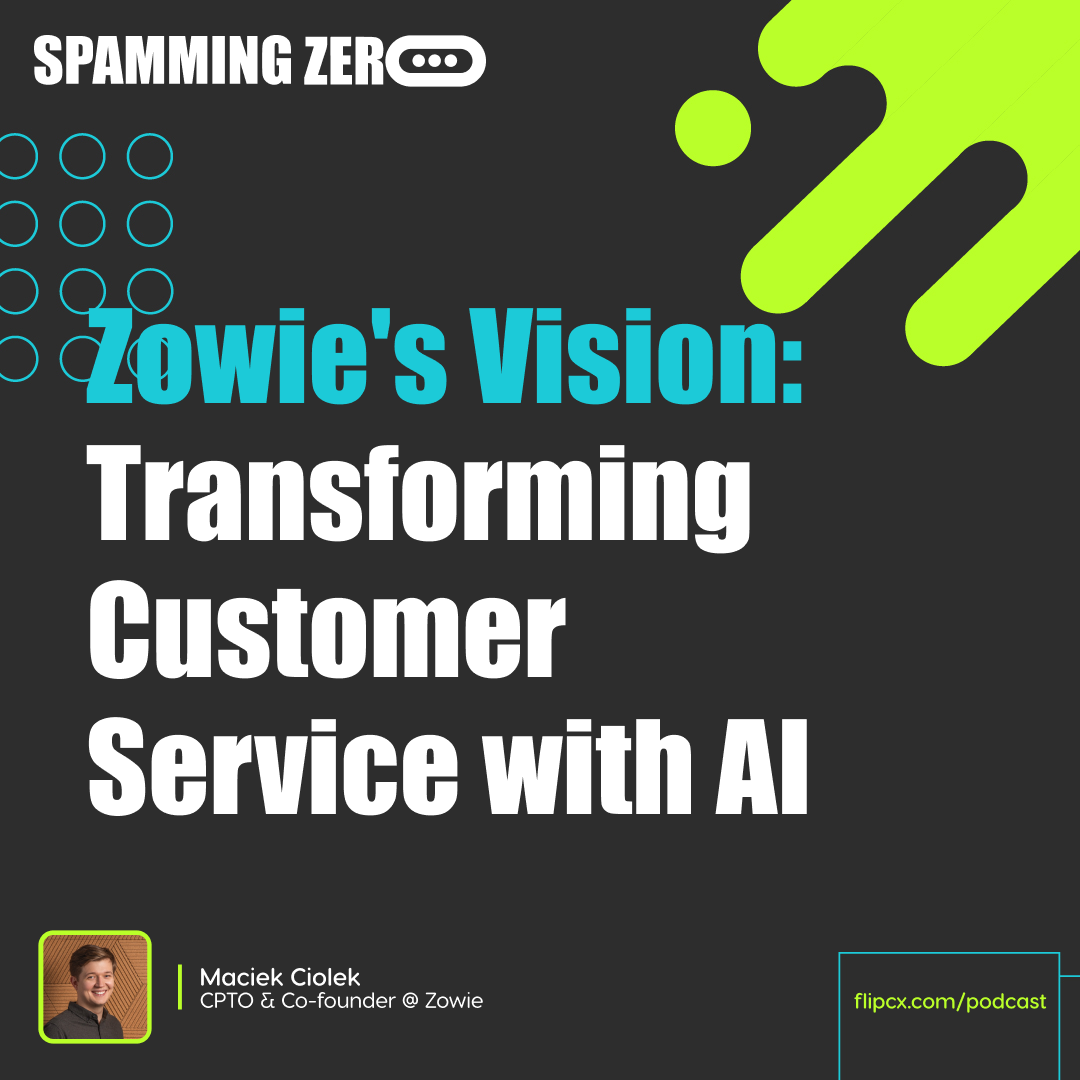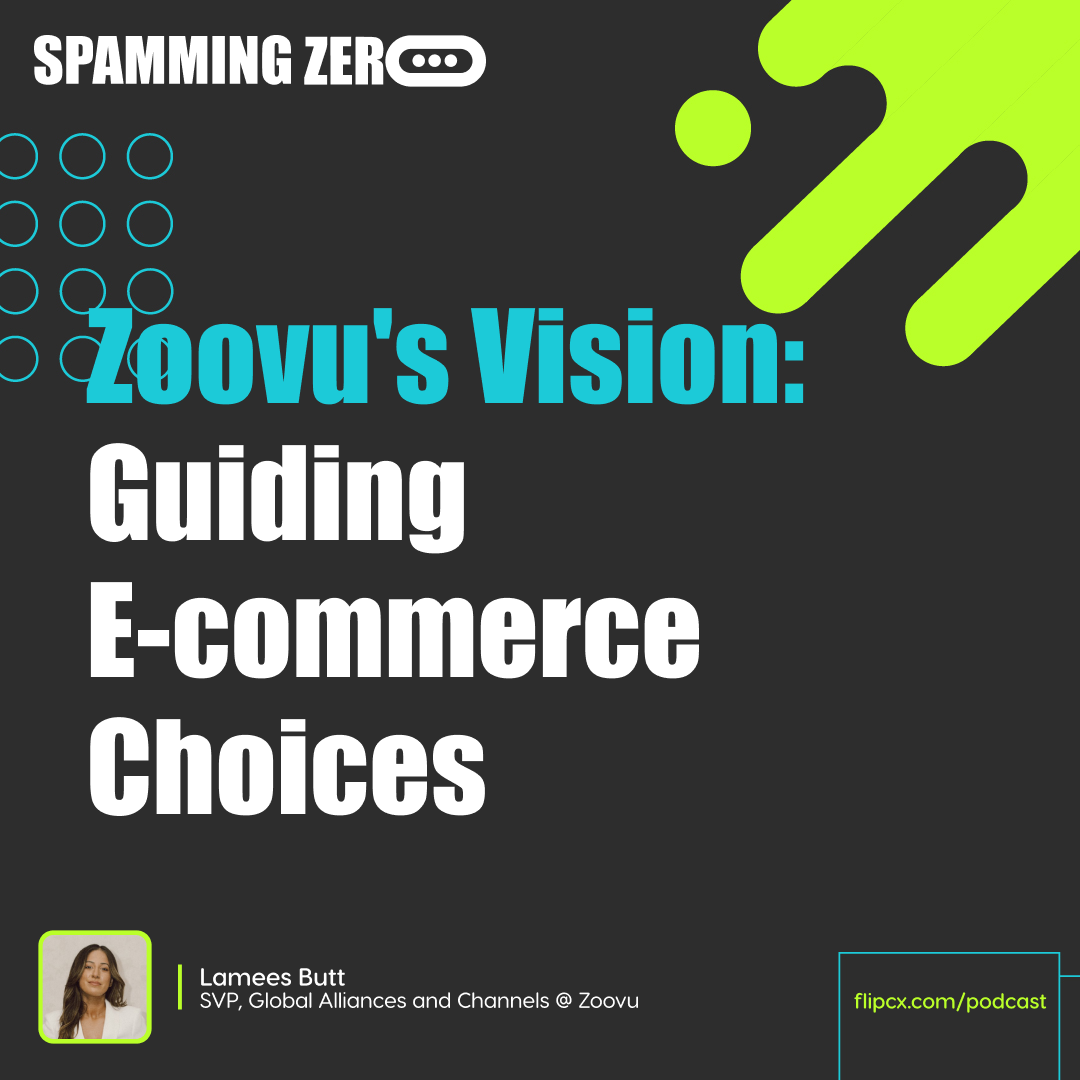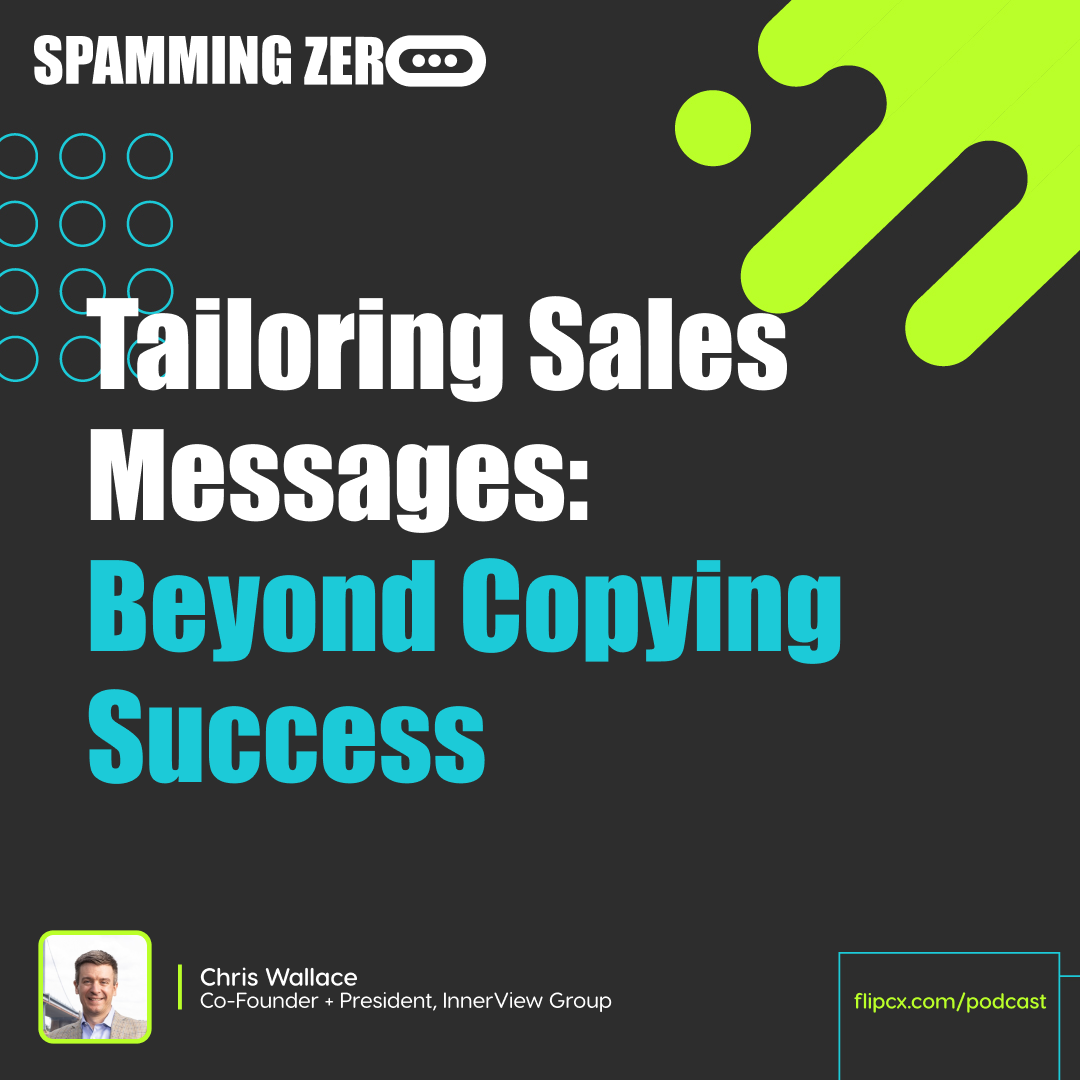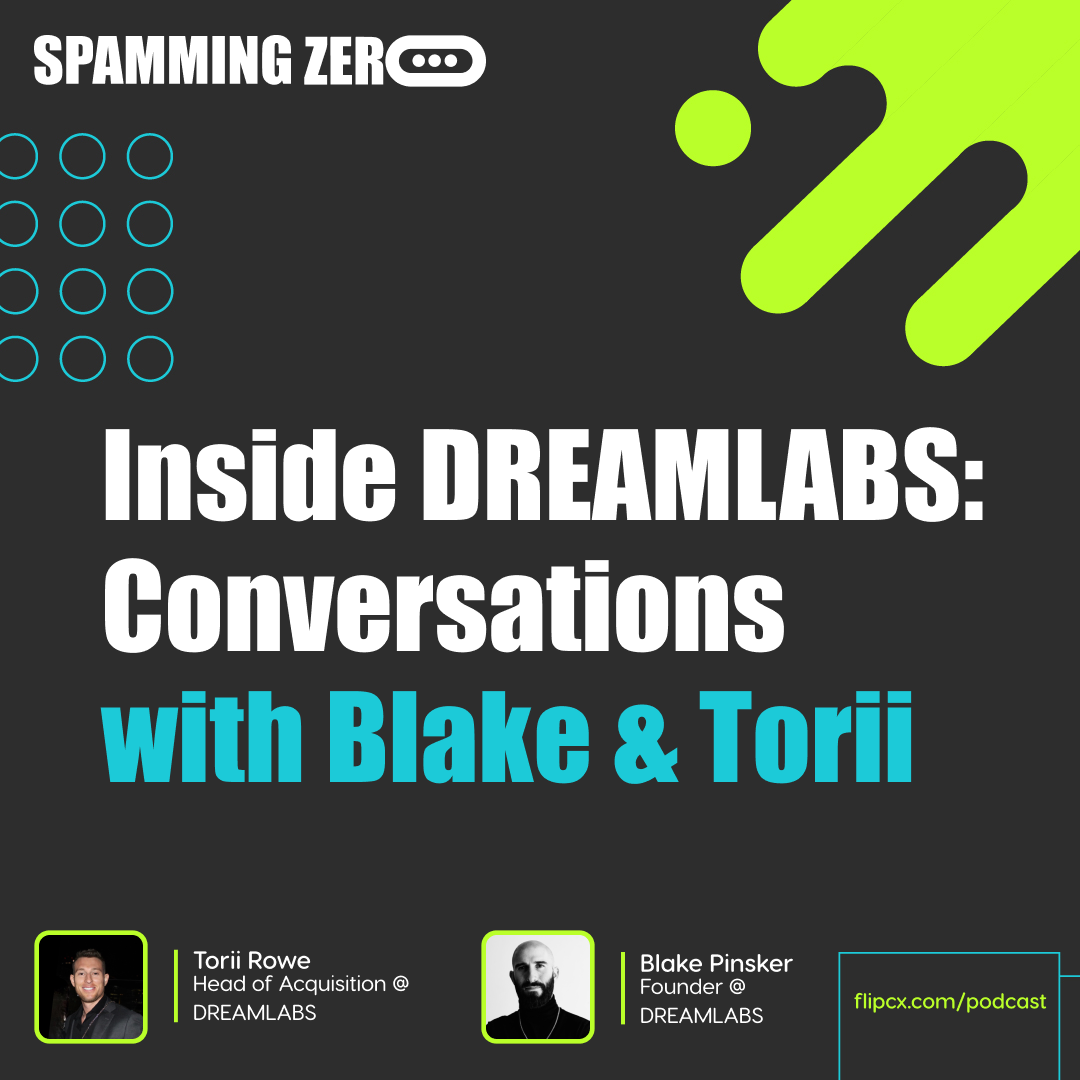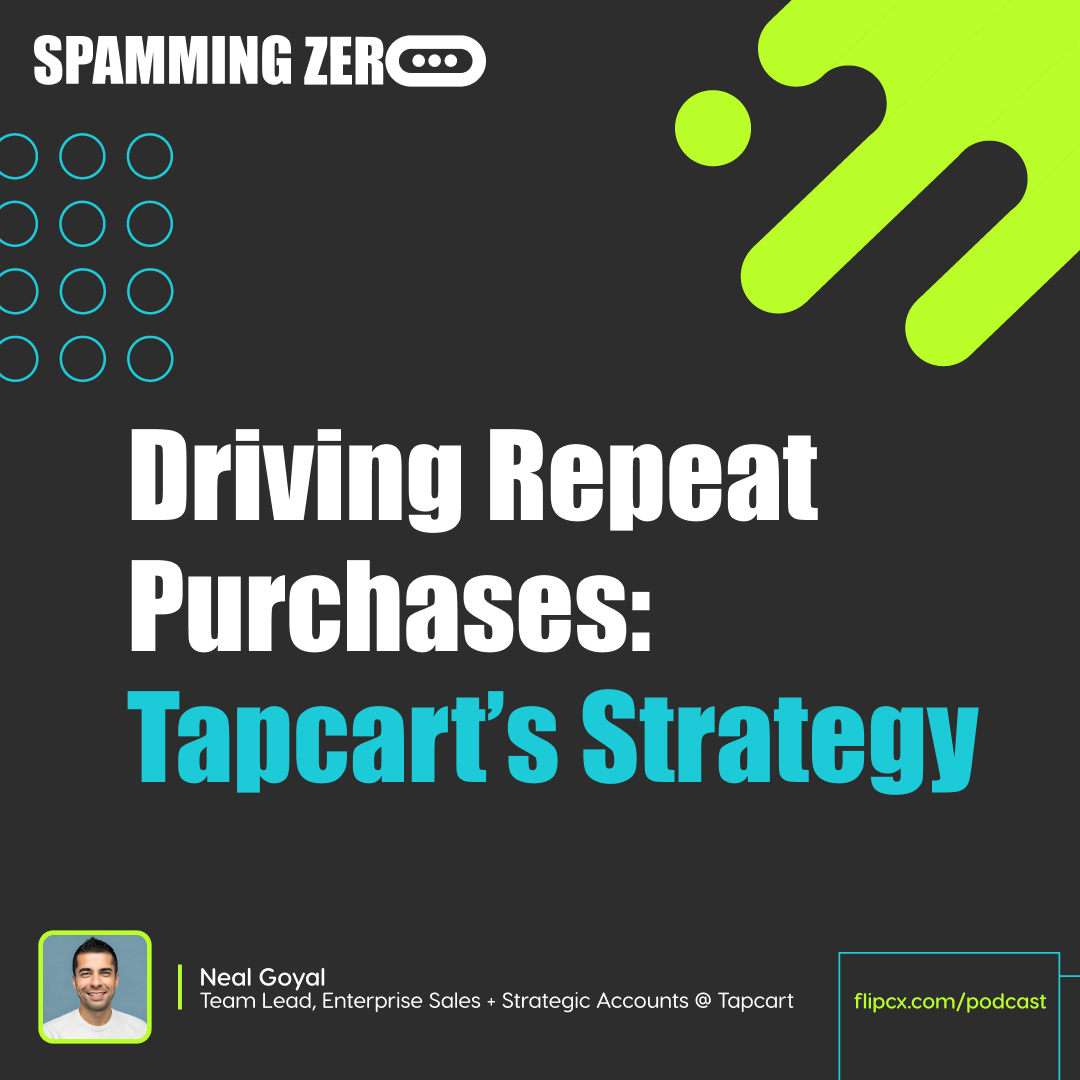Episode 48: Ecomm, Automation, and The World of Music Production - with Darren Vader
- 0.5
- 1
- 1.25
- 1.5
- 1.75
- 2
James Gilbert: ...May's sponsor of the Spamming Zero Podcast is TTEC. com. TTEC is a customer experience firm that focuses on several different industries, but one in particular is retail and e- commerce, to all of our listeners out there. Their website, again, if you need the phonetic spelling of that, it's T- T- E-C. com, TTEC. I love what they have on their About Us page, " The power of big, and the agility of small." They're a big company, but they have the agility to do a lot just like a small company does. I also love it the fact that they're in six continents, 50 languages, employees globally of 69, 000, and their client NPS is + 71. Pretty awesome. A couple of other things about TTEC is, they're customer- obsessed, digitally empowered, and outcome- focused. Some of the CX solutions they offer are customer- care outsourcing, so if you need to be PO, they can be your partner, contact center outsourcing, as well as CX solutions and strategy. Reach out to TTEC. com. I'm James.
Brian : And I'm Brian.
James Gilbert: And this is Spamming Zero. Welcome to the show everybody. James Gilbert, I'm your host. Thank you for all of our listeners out there. You've been with us now for quite a while, and love that you are listening. Please, if you are listening today, tell others about this. I am super excited because today we are joined by Darren Vader. Darren, welcome to the show.
Darren Vader: Thanks, James. Yeah, I guess you want me to talk a bit about myself, huh?
James Gilbert: Yeah, tell the audience, why are we talking to you, Darren?
Darren Vader: Sure. It's fun to talk about yourself. So, I'm the founder of the Christmas Light Emporium. An entrepreneur first, I would say, but the Christmas Light Emporium is our e- commerce business that is very seasonal. We sell Christmas lights and accessories and all that sort of stuff online, and we are in super heavy growth mode in that space. Also, involved in a few other things, including the design and installation of giant commercial light shows for people like the Atlanta Braves and NASA and a lot of others. And I also do music production for some people you've may have heard of and a lot of people you probably haven't.
James Gilbert: We're going to dive into all this, because I'm telling you, one of the things that excited me about having Darren on was that musical production stuff, because I myself, I've never produced an album by any means, but when I went through the situations with my eyes where I couldn't see, I learned how to play the piano by ear, and so I started what's considered writing and composing my own music and singing to it and all that fun stuff. Now, it's become a fun little thing with our family. So, I have a deep appreciation for the music that people create. And I want to dive into that, but before we're do, we're going to do that in just a bit, talk to us, what is your hot take when it comes to, you run an e- commerce business, and you're a small shop, you don't have a lot of folks helping you.
Darren Vader: That's true.
James Gilbert: What's your biggest piece of advice that you're going to give others?
Darren Vader: I suppose that whenever anybody asks me for advice, I always try to pinpoint the context, because generic advice is basically useless, out of context. I think that most people are in business to be profitable. We had a conversation the other day about non- profits. Also, at least have to break even or be profitable. Everybody has to be profitable or you don't exist. So, that would be where I think the most valuable advice would come from is about profitable. So, we used to, or I did anyway, the people around me would laugh sometimes, but I would say that the thing I was the most proud of was that we didn't have any full- time employees until literally about a month ago, but we've been around since 2012, and that's achieved through automation, and that's-
James Gilbert: Hold on, hold on, hold on.
Darren Vader: Yep.
James Gilbert: If you didn't just hear that, what year is it right now? It's 2023, which means for 11 years you operated without employees?
Darren Vader: True. See, now, I always have to elaborate. People are like, " That's not possible. Who worked for you, R2D2? So, it's a bit of a stretch. We had a couple of people that were part- time contracted, but they were paid on a commission basis, which is weird in an e- commerce space. Those were people who worked in our warehouse, and it was only one, it was one guy. And he got paid a percentage of the value of every order that he shipped, and that's how we controlled cash- flow in a seasonal business was, sometimes we didn't have to pay him at all because he didn't do anything for us. So, that's how it goes, and that that's how we did everything. So, I always would tell people that's how I managed to build everything I do is I always start with no inventory. I drop- ship everything until something starts to sell and be profitable. Then, I bring in the inventory just one step at a time. But whenever you see somebody who's all gung- ho about a new business idea, and it's all the time, it's almost everyone that thinks they want to be an entrepreneur, and they have what they think is a great idea, and if it's a product- based idea, there's often development costs, or even if it's just a retail type of an idea, they just want to dump a bunch of money into inventory and think that the world's going to show up and beg them to sell them the product. So, my biggest piece of advice would be, don't do that.
James Gilbert: Darren, when does the season actually start for you? When do you start planning?
Darren Vader: Now, it's all the time, all year long, but it's cyclical throughout a year. So, our cycle is annual versus a lot of other businesses that are not so seasonal. All businesses are seasonal, but not like this one. But they tend to think of things either monthly or quarterly, usually quarterly. So, we think of things about only really one quarter. We think of quarter four and that's it, that's all that matters. It used to be really true. Now, it's not as true. So, we divide the business up into activities. That's what drives our annual cycle, which is, Q1 is all about preparing inventory for the coming Q4, and Q2 is about new products and any major technical changes we might want to make to any of the technology that we're using. And by the end of Q2, we start to receive the new inventory that was purchased in Q1. So, there's a lot of work around preparing new inventory. Then, we do, what I call lock- and- load, at the end of Q3, which is, nothing changes. After about end of September we don't change anything. Everything stays the status quo from then until the end of the year, and then we have a big blowout sale and get rid of as much inventory as possible and do the whole thing again.
James Gilbert: It's always interesting to me because you run a business that is very heavily reliant upon the seasonality of the year, but also, you still don't ramp up your employees during that seasonality time, and you've set yourself up to where you can automate a lot of it. I don't want to talk about, necessarily, the specific technology that you're using to do the automation, but after talking to you prior, one of the things that I felt was really cool is how much you lean into automation to help get through those moments. So, what's your piece of advice for people that have a lot of fear around automation. They're fearful that it's going to have a huge impact on their revenue streams and their customer base. What would you tell them?
Darren Vader: I would probably first tell them that if they're afraid of technology and afraid of automation specifically, then they're probably moving too slow and they won't be around anyway. So, it's a fact of life. I actually still have hesitations. An example would be, we have an ability to never touch an order when it comes in. Whether we are shipping it direct from our warehouse or whether we're sending it off to another supplier to drop- ship, we don't have to intercept those orders in any manual fashion at all. But I do. And it's my fear of automation, in a way. I can't even think... I think that I'm actually... I know that I'm spending more time when I do that, a lot more time than I need to be because I started doing that, manual interception of orders, meaning, I checked almost every order, at least at a glance, to make sure everything was correct before it got automatically shipped off, sent off somewhere electronically to be fulfilled. And I did that initially. Then, we're talking eight years ago when I started doing that, probably, because I was afraid that there would be too many mistakes and problems. And a small problem in an automation scenario creates a backlog of problems, so you have to do your automation right or you have more problems than you started out with. But I just never changed that habit. So, to this day, I still check, at least at a glance at the end of the day, every order that comes through. That doesn't happen starting around early November when there's just too many to do that. But it is the thing, I could just let it all go completely automated and not ever look at any of it, but I care too much about making sure everything is done right to do that.
James Gilbert: Which I think is a great practice because I think that that alludes me to another point that I think a lot of people are feeling right now, which is, there's a general fear that AI is going to take over people's jobs and, " Oh, you're not gonna be able to have a job anymore." And that's just not true. Darren just provided a perfect example. It does require human intervention, it requires you to check it. We want to make sure that it's running smoothly. With technology there's always going to be hiccups and things that don't operate perfectly, and I think that human intervention is the key to that. But I want to shift gears now. We talked about Christmas Light Emporium, what you think about automation, how you manage that business from a seasonality perspective. Now, I want to talk about this music stuff. If you're not able to see the video of this podcast and you're listening today, go take a look at it on YouTube when it's ready to go, because you're going to want to see Darren's background. He's got two guitars behind him, he's got a fun little Andrew Carey... Does that light up, by the way?
Darren Vader: It does. We call it neon.
James Gilbert: Yeah. So, Darren, I don't know if you can reveal any of the artists that you've worked with, if there's some contractuality behind that, but if you can, who have you worked with?
Darren Vader: There are some names I can name, and most people who hear this, probably wouldn't know most of them because they're not based in the States. So, I work, relatively often, a couple of times a year with a guy out of Venezuela by the name of Sam Ort, who is a very quick up- and- coming dance music producer out of Venezuela. He just won, I'm trying to remember which one it, it was one of the, we have this People's Choice Awards, and they have a similar thing in Venezuela, which he won that just recently. But he's a super nice guy, he's fun to work with. And very often I will write a track, and I just put a terrible demo together. I won't even put any effort into it, and I'll just send it off to Sam and say, " Here, do something with that," and he will. And we actually have a single coming out on TMG, 2- Dutch Records, in May, that he did. That's exactly how that track went down. So, sometimes that's how things go out. Other times I'll be producing other people's music. There's a girl I love, and she's in Belgium. And I can't pronounce her name, otherwise I would try for you. Lisalet is her first name. I can't... Verocus, I think, is her last name. No one knows who she is because I found her and heard a demo and I just thought, " I want to be a part of that. That's amazing." So, she doesn't have, I don't think, anything released at all yet, but-
James Gilbert: What genre does she write in?
Darren Vader: I'd say it's going to end up, maybe it would fall into the Pop category, more dark introspective Pop, I suppose. She's got a beautiful voice, fantastic songwriter too. But we're in the middle of that one. I work with some artists, two singers who were top 10 on American Idol whose name's can't mention because they do have contracts.
James Gilbert: Hey, you plugged American Idol in there, so the audience can go and have some fun doing some research on who you've worked with maybe.
Darren Vader: There you go. Yep. It's fun, it's a fun business.
James Gilbert: Darren, I don't know if this is going to be totally revealing to a lot of the audience that might be listening today, but it goes without saying, working with musical artists has always been quite difficult. There's a lot of opinions, there's a lot of specifics. Talk to us a bit about that, because that's your customer. So, talk to us about the customer experience when you're working with really difficult people and you have to manage through that.
Darren Vader: Yeah. So, something I learned really just recently over the last couple of years is that being in music production and having artists as your customer doesn't work quite the same way as any other customer relationship I have ever had, meaning that I get fired more often. I just got fired about two weeks ago from a project. Now, I say that, in the music industry, nobody calls it being fired. It's just, when you begin a collaboration with a new artist, there's a lot of emotion in music and there's a lot of emotion in art, and that's what it's all about, way more than there is in any other kind of business outside of art. So, there has to be a fit on in the creative direction. Just like everybody laughs when you hear such and such a band broke up because the guitar player had creative differences with the drummer or whatever, and you sort of laugh and roll your eyes and go, " Oh, they're just being babies because nobody could figure out how to split the$ 4 million they made last week," or whatever. But it's true, you can't work with people in a creative pursuit if you're not headed down the same road. Nothing good ever comes of it. So, the best thing to do is to try to figure that out quickly, and that's what I mean by getting fired. I put it that way just because it's fun to say. But really, it's a matter of, whenever I start working with a new artist, we spend probably two weeks to a month of Zoom calls and some writing sessions and things just to see if we're on the same page. And if we're not, we just shake hands and say, " You know what, if something comes up that's along the lines of what we're doing here, then let's try again later, but this isn't going to be the thing." So, yeah, it's fun. Then, there's, within the industry, a lot of people don't realize, but there's a whole unwritten rule book about how to behave when you're in the production side of music, because the preparation is different. An artist generally has a pretty solid vision of what they think needs to happen in any given situation, and they're not always right, and they're not always good either. I would say most, I'm going to call it 50-50, about 50% of singers don't sing very well. So, the only reason they sound like they do is because if people like us. You can't say that though in a room with... and I hope none of them hear this, but-
James Gilbert: Well, the thing is though, their fans are going to hear it live, right?
Darren Vader: Yeah, but even live now, ever since... I have a good friend who was a bass player and singer in a very well- known Country band back in the late'90s. They had these couple of big hits, and sang the male part on a song that was a number one, still one of the biggest Country songs of all time. They ended up suing their boss, and they got fired. You don't sue your boss. That's a bad idea. So, he talked about all the different job offers that he had after that project went away, and one of them was from a band that is, to this day, still very well- known, had asked him to join them. And he said he didn't want to do it because he hated one of their songs and he didn't want to have to play it every single night. But part of the conversations he had with this band, who is still touring today, was about how they perform their music live because they don't perform everything live. They don't even perform their own instruments, most people don't, on a record. Most people don't know that on a record, the only thing on there is maybe the voice of the singer that is actually what you're going to see live. Even live, people play to backing tracks, almost every single show does that, including vocals. They used to call it lip- syncing, now they call it backing tracks.
James Gilbert: I remember learning about this when I started writing my own music and singing to it, and I don't claim to have a great voice by any means, but I remember learning about this, and it really bothered me when I found out about it. I was like, " Wait a minute. There's people out there that are making millions and they don't even write their own music? They just show up and record it in a studio and..." It is wild when you really dive into it and you learn about all the people out there that really don't, but then you learn about producers and things like that that are just incredibly good at all of that, and those are the ones that I tend to lean and respect a lot more.
Darren Vader: I'd say that. And I'm saying all those negative things, but the reality is, there's the other 50% or more who actually are massively talented, and those are the ones that last forever because they're good at what they do.
James Gilbert: So, let's talk a bit more about this, because I do think that there are some relatable topics that can apply here. You're dealing with really particular customers, ones that feel as though their art is being challenged at times, right?
Darren Vader: Exactly.
James Gilbert: And I think that this is actually applicable, in my mind, to a lot of products out there. People fall in love with them, they can't get them, you make a change to something in the process with the customer experience and people get upset, or both negative and positive changes can make a big difference. Like, you look at the changes that Chewy makes, for example, with the pet world, and I hear all the time about how there's people that have to euthanize their pets, and Chewy will send them flowers. And that's a proactive type of experience. And when it comes to the musical industry, I feel the intricacies of working with an artist, because you're an artist yourself as a producer, and so you have these two worlds clashing together in some ways, and they need to mesh and they need to mesh quickly. So, what is some of your tricks to making sure that those mesh quickly?
Darren Vader: Yeah, I think the biggest one is research and preparation, really. I don't go into a new session... I have a new one Saturday, which is interesting, and that's two days from now, and it's with my daughter's boyfriend who is a singer, and he's a really good one, and he's super young. I think he's 17. So, I'm super looking forward to that. But I need him to want work with me because I love his voice. So, I'm spending time where I'm preparing sessions within our recording and writing tools with ideas ahead of time. I'm throwing lyric bits and pieces together ahead of time, I'm researching the shows that he's done to see what songs he's sang at his shows to get a sense for his taste as an artist. That's when I'm coming into it with someone who I want to work with. I do have a leg up and that I at least have met him before, but in a case where it's someone you've never met before, which happens most of the time, that's scary because you don't really have anything to go off of other than... Usually, what happens is somebody says, " I think you would work really well with so- and- so," and somebody makes an introduction. And because there's this common person between you, you agreed to a session, but you're both thinking that this third party may be wrong. What if they're wrong? What if we're not a good match? So, all you can do at that point is listen to each other's music and try to be prepared with the types of sounds you bring to the session, the type of lyrical content you bring to a session, the type of instrumentation you bring to a session, sometimes even about the place that you meet to conduct the session plays into the personality of the artist. Some people hate working in studios and prefer living rooms, and things like that. So, sometimes you don't know those things until after that first session.
James Gilbert: Darren, what's your favorite type of music?
Darren Vader: Oh, wow, that's a loaded question. I love almost everything. There's a lot of, believe it or not, modern, I don't even know what you call it, I guess it's called Pop now, I used to call it Hip- hop, but I think it's just the most popular music right now that I don't understand. I don't understand it. I don't understand the monotone nature of the delivery and the lack of music in it, but it's super popular. I don't understand it to the point where I've been consciously making effort to learn to understand it, sort of, what is it about this music that's attractive? But if I had to pick something, and I actually did this recently where I sat down and I said, if I were to go say I was going to start a new project and it was going to be an album of all me, I wrote, it's all me and I'm the artist, I decided I think it would be, I think what people these days call synth- wave or it's very heavily'80s New Wave influenced pop, basically. That would be what it would be, but with a little darker side, like my favorite artists are Depeche Mode, right?
James Gilbert: Yeah.
Darren Vader: One of my favorites of all time. So, I think it would be certainly along very synth heavy, something along that lines. I'm also a huge'80s hair- metal fanatic, which is really weird, because I don't write or produce anything in that genre at all.
James Gilbert: I don't know if you've ever heard of this, they're a pretty popular band now, but they didn't start that way, and I find them to be incredibly talented because they do write, sing, produce all of their own music. I shouldn't say produce because I don't know... I'm sure they're working with some producers. But they're called a AJR. It's super... Go check them out. I think that they actually showed at their show, I went to one of their shows live with my son who is obsessed with them and my wife who really likes them too, and we went to one of their shows. And they showed how they reverse engineered a song and how they came up with some of the unique sounds that they use. And man, it was wild to see that live. And they performed it live and showed how they did it live, and I was like, " That was cool."
Darren Vader: That does sound pretty cool, yeah. And it also reminds me of one of the things I love about these conversations is, I've never heard of that group. So, I love it when somebody throws something out there that I don't know, because I just typed a note, " Check them out."
James Gilbert: Another fun one for you. It might fit. So, this artist is a Hip- hop artist, but a bit less monotone. He uses a lot more of... they actually sing to their songs as well. The dynamics of their song songs is very interesting. But it's a Hip- hop artist that also doesn't sing swear a single time.
Darren Vader: Ah, there you go. This is key.
James Gilbert: Which is rare, right? Because a lot of Hip- hop is like swear, swear, a bit of lyrics here and there. So, this Hip- hop artist's name is called VF, just the letters VF. Go check him out. He is awesome. His new album's pretty amazing too. One song in particular that I really like on it is, let's see here, what is it called? I've been listening to it all week. It's called Happy. I really like that one.
Darren Vader: It reminded me, there's track that I'm actually supposedly going to finish today, and I've been working on. There was a track called Salt on Your Tongue. This singer's a very sexy track, but I wish my wife would stop texting me. Don't tell her I said that.
James Gilbert: She's texting me all the New Age music that you made me listen to-
Darren Vader: Yeah, probably. Anyway. So, this song, we wrote and recorded this bridge, which is for people who don't know, it's sort of the middle part of a song that, it changes things up a bit and then sends you off into the final parts of the song. And I didn't think it really fits so well. So, we were throwing around the idea of bringing in a rapper to change it up a bit, which I did. And I was playing that song for another producer that I know who actually, strangely enough, he's produced a lot of Depeche Mode's stuff over the years, but he's listening to it, he's like, " Man, this is great, this is great, this is great." Then, he got to that bridge and that rapper started, and he stopped the track, and he said, " Who is that?" And I told him, and he said, " Well, tell him to go get his own record. He doesn't need to be on this one." He hated it. But guess what? He's still on it, and he just rerecorded that vocal take last week, and that's how it's getting released. So, even opinions among producers can vary.
James Gilbert: I Love it. So, I do want to just quickly dive into some of the work that you're doing there, especially with the production stuff. I'm curious, especially as somebody who has written music myself, what is the hardest part of writing a song? Is it the lyrics, is it the story you've got to tell behind the lyrics, is it the beat, is it the bridge, what is it?
Darren Vader: I think that's going to be different for different people, even different producers. For me, it's anything related to lyric. I can fluently put an idea out of my head or someone else's reasonably quickly when it comes to beats and sound selection and sound design and all of those things, and arrangement is a piece of cake. And I can throw down a pretty decent lyric with a catchy hook pretty easily, but usually, it just comes across as a bit corny. Writing a great story song is the hardest thing for anyone. And I said it's different for everybody, but the reality is, even great lyricists have a very hard time writing a great story song, which is, I think, why, today, if you were to listen to any, I don't know, playlist or radio station or whatever you listen to, and switch between genres over the course of, I don't know, say every four or five songs and do a comparison test of lyric, you would find, I think, I've not done this test, but here's what I believe you would find is, I believe that on modern Pop or Hip- hop type of channels you'd find little to no lyrical depth at all. And in the Pop space, hit or miss. It's probably 70, not so much, 30 or 40, maybe there's some depth in there, and you skip straight to Country music and it's going to flip. You're going to see, if you don't have a great story song in the Country space, you're probably not in the Country... you're not doing it, it's not a thing
James Gilbert: That's true.
Darren Vader: Then, you go as far as even classical music where there are no lyric, but if you're an instrumentalist, that's where I started as a trumpet player, that was where I started everything, so instrumental music is the first experiences that I ever had. And when you understand the melodies in instrumental music, it's the same thing as a voice in vocally or lyrically- driven music. You just hear it differently. The words speak differently. And if you understand that, then you say, okay, who's the greatest lyricist of all time? And I believe the greatest instrumentalists of all time are actually the best lyricists, which is a weird thing to say, but I believe that's true.
James Gilbert: So, who do you think is?
Darren Vader: The best actual lyricist?
James Gilbert: Yeah.
Darren Vader: Who actually writes words?
James Gilbert: Uh-huh.
Darren Vader: Man, I'm going to say something, I'm going to go on a limb because I've had an infatuation with her for a few years now, that would be Taylor Swift. And you have to put it into context in that she's not writing stories that have, well, usually, a deep need to change the world, but she writes great stories about herself and about her experiences and about her life and has this knack with the rhythm and the lyric delivery and things that nobody else except maybe Ed Sheeran has
James Gilbert: Ed Sheeran, that's a good one. I was not expecting Taylor Swift.
Darren Vader: Nobody does it. It's a bit-
James Gilbert: Whoa.
Darren Vader: It is pretty funny, but whenever-
James Gilbert: What about Adam Levine from Maroon 5?
Darren Vader: Oh, sure. If you want to get right into forget the performers and go straight into songwriters, which, let's throw names out nobody knows. Adam Levine, for sure, and certainly people know who that is. Let's talk about, oh, gosh, the singer from One Republic, Ryan Tetter. He's-
James Gilbert: Yeah, Ryan Tetter.
Darren Vader: He's the greatest songwriter that's ever freaking lived, and a genius at it. Sharon Vaughn, let's go way back. You know this, Willie Nelson, I think, made it famous. It was a long time ago, " My heroes can always be... My heroes..." What is that? " My heroes have always been cowboys," or-
James Gilbert: Yeah.
Darren Vader: ...something like that, whatever that track, well, she wrote that. And many, many, many other both Pop and Country hit songs. She listened to something I had written. It was written as a pop song, but it came out sounding Country. So, I went to Sharon and I said, " What do you think of this song?" I was asking about the production of it, I was asking, " Should this be a Country song?" And she just ignored all of that, and she basically tore my lyrics to shreds. Then, she's like, " I'm a story writer, and you've got some problems with that story." So, an example was... This is a purist, Sharon Vaughn is a purist. You can't have anything wrong with your lyrical story. And the very first line, the song was called Weekend. And it was about, it's basically a a party song. It's just about looking forward to the weekend. So, the very first line of the song is, " I've been looking forward to the weekend for a minute." And she stopped right there and she said, " No, you haven't. You've been looking forward to it for a lot longer than a minute. That doesn't make any sense. You need to change that and say what you really mean." And I'm like, " Sharon, come on, it's a thing, right? It doesn't mean minute, it means a long time." She's said, " I don't care. It doesn't matter. Say what you mean." I'm like, "Oh, my gosh, she's tearing me apart." But I got such a complex over it. That song is still sitting on the shelf. Nothing's ever happened to it because now I'm all paranoid that it's not good, but...
James Gilbert: I love these stories. I feel we could talk for hours about this stuff because I just find it so fascinating.
Darren Vader: It is fascinating, and it's a love too. For me, the whole thing started, I say started because I didn't do anything in music for 30 years. And COVID came along and reminded me of what I really loved about life, and that was music. So, that's what we did. And just one-
James Gilbert: Music has gotten me through some of the toughest times in my life, for sure.
Darren Vader: Yep.
James Gilbert: If I wouldn't have had that piano, I would've been in trouble.
Darren Vader: So-
James Gilbert: What's your go- to instrument to play?
Darren Vader: Oh, I was just about to say. It is funny, I always say, the box, meaning-
James Gilbert: The box?
Darren Vader: ...everything I do is inside the box, which means my laptop. So, if I do, say once in a while, I don't play any instrument anymore at a level that allows me to play it live or in any of our recordings because everyone around me is so much better at that than I am-
James Gilbert: Sure.
Darren Vader: ...at the level we're at now. But I still do. Obviously, you have to play in the parts when you're recording tracks and things like that. Whenever I use guitar loops for demos, if that demo gets picked up or is going to be sold in one form or another, I always rerecord the guitar parts. I never release anything with a ripped- off guitar loop in it. So, I have to have these guitars back here for that purpose. But I can't really play a guitar. In fact, I might have to do eight tracks of guitar to get what a guitar player might do in one. And it's the same with piano. I love piano. And in my younger days I played in bands as the keyboard player, not the pianist. Not the same thing. Because my son, who is a pianist, asked me one day why I made such a big deal about the difference between a pianist and a keyboard player. And I had told him that a pianist plays with two hands and a keyboard player plays with only one, that's the difference, because one hand's always up in the air and the other one's playing on the keyboard.
James Gilbert: Oh, man, this is awesome. Darren, we are at time, and I want to ask you the last question, and I try to ask all of our guests this that come on the show. Tell us about an experience that you've had in your life, it could be related to music, it could be unrelated to music, it could be related to something that you've purchased and you were like, " Holy smokes, that was amazing," tell me about an experience that just left you shocked at how good it was.
Darren Vader: I have so many of those. I live my life based on those. I tell my kids, " If you're living a life that people don't believe, then you're living your best life. And don't worry about it, that's how it should be." So, mine was when I decided, I had never left the country, I had never traveled internationally ever prior to me deciding that I was going to go to Mount Everest. So, I did that, and it was 2014, which for anybody who follows that sort of thing would remember that 2014 was the year that there was an avalanche that killed everybody, and everybody left, and we were there when that happened. So, that was life changing. It was awesome. When I talk about it even I still get a bit emotional because it was the best experience of my life in a million different ways. Learning how to walk for weeks on end with no entertainment and no work to be done, just walk, that's something I believe that everyone should try to do because you'll find that you will be able to do it. For me, it took about three days to shut the brain off and enjoy and just use the time wisely, I would say. There's a long, what do they call it in Spain, there's a pilgrimage trail, I can't remember the Santiago Trail or something like this they call it, that I've had on my hit list now. Some people spend a month, some people spend six months walking that trail through Spain over the Pyrenees and in Spain. So, there was that kind of experience. There was the experience of being in a place where Kathmandu, Nepal, for example, where most people I know just... I actually had somebody say they thought that was just a fictional town from Indiana Jones movies. And it looks like a fictional town from an Indiana Jones movie. But to see people in those kinds of places, that live the way that they have to live and they're happier than we are by a long shot. And it makes you really think about priorities and things. Then, to end that experience with a global tragedy and watch it happen, and then, watch the news channels reporting absolutely false information, there was this whole thing of that experience that was super positive and super uplifting and super spiritual in my life, changed my life for the better in a million different ways. And at the same time, I don't know if it was some universe reaction to all of that by slapping us all and saying, " Hey, that's cool that you had that great experience, but don't forget, it's reality. And just as many bad things happen as there are good things that happen, and that's just life, so deal with it." Mostly it was positive.
James Gilbert: Darren, thank you so much for joining us on the podcast today. You've been awesome.
Darren Vader: Thanks. Thanks for having me on.
James Gilbert: Don't forget to subscribe and like that podcast if you like it. If you don't like it, don't like it. But if you can give us a review, we'd love it. Any star would be appreciated. Let us know how we're doing. If you have a topic or a guest that you want me to bring on the show, let me know. You can reach out to me on LinkedIn. Thanks again.
DESCRIPTION
Here on Spamming Zero, we’re all about the power of perspective and unique experience. And that’s precisely what you’ll get in this week’s episode, with Darren Vader.
Not only is Darren Founder of The Christmas Light Emporium (and a master of incorporating automation to streamline his business), but he’s also a music producer with fascinating insights to share. And you might be surprised how very much Ecomm and the world of music production have in common.
What’s Covered?
- Darren’s unique background
- Top tips for other small biz Ecomm brands
- Advice for those who are hesitant about automation
- CX lens: working with music artists with particular tastes
- Successfully meshing two worlds - being an artist & working with artists
- Songwriting challenges - and who Darren believes are the all-time best
- Thoughts on artists like Taylor Swift, Adam Levine, Ryan Tedder, Sharron Vaughn
- An Everest experience that changed Darren’s life
- And more
Ready for more fantastic Spamming Zero conversations ahead? Listen, rate, and subscribe on YouTube, Casted, Apple Podcast, or Google podcasts.
Today's Host
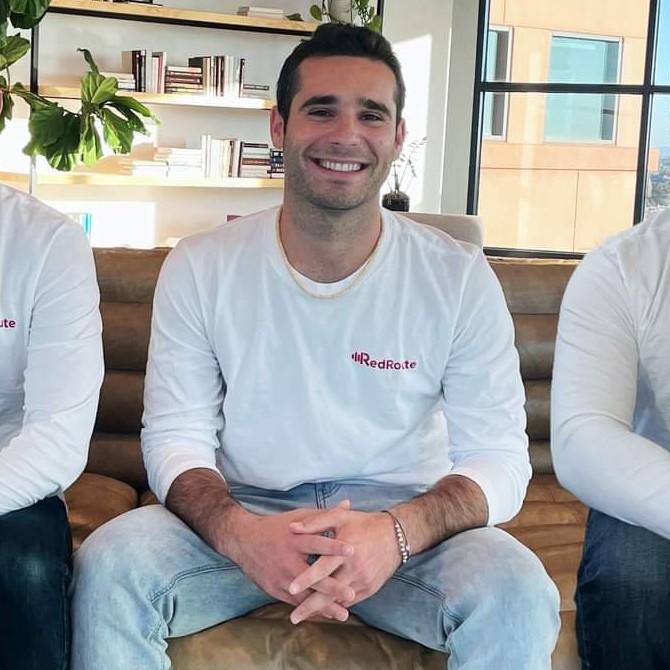
Brian Schiff
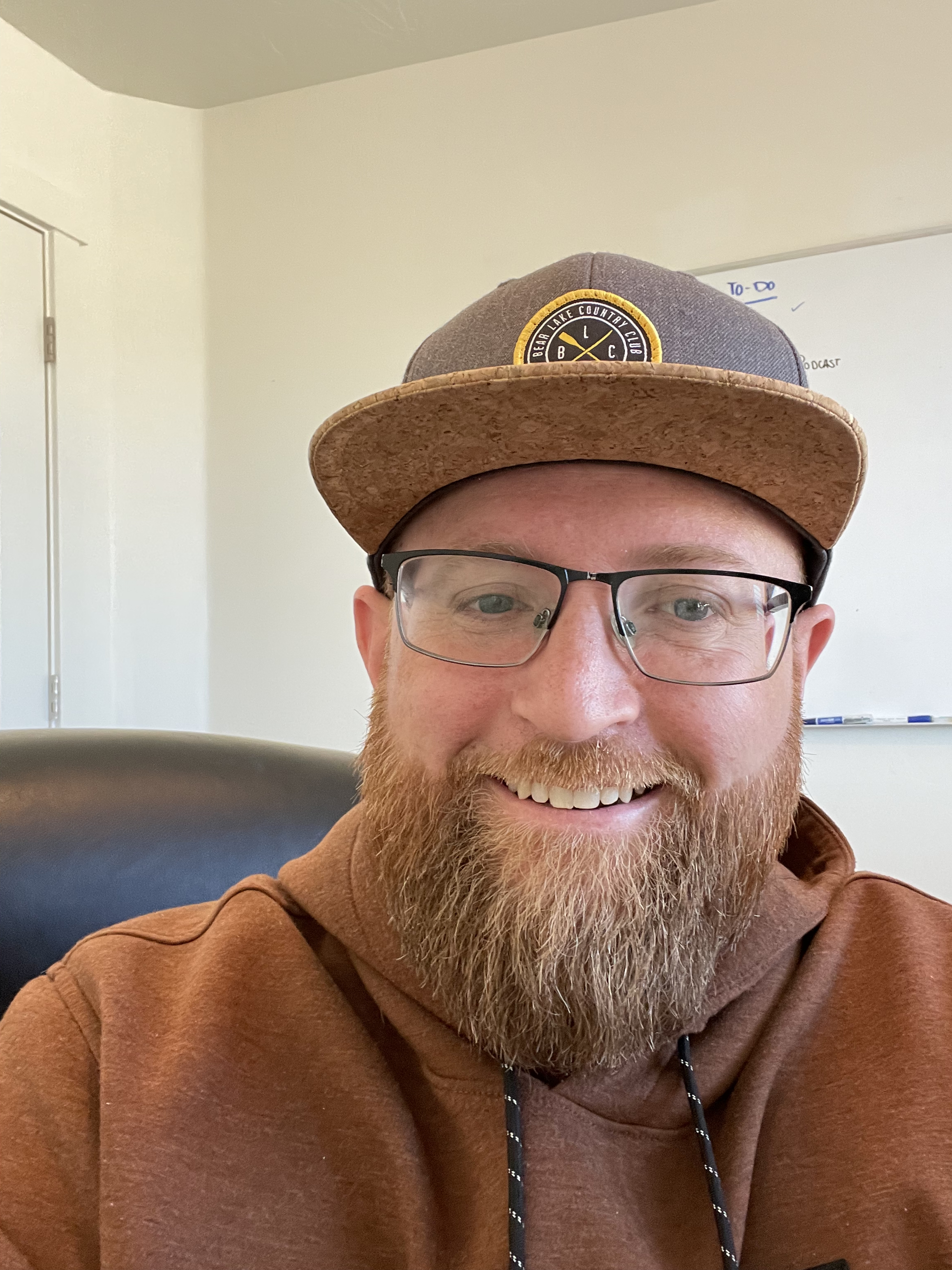
James Gilbert
Today's Guests

